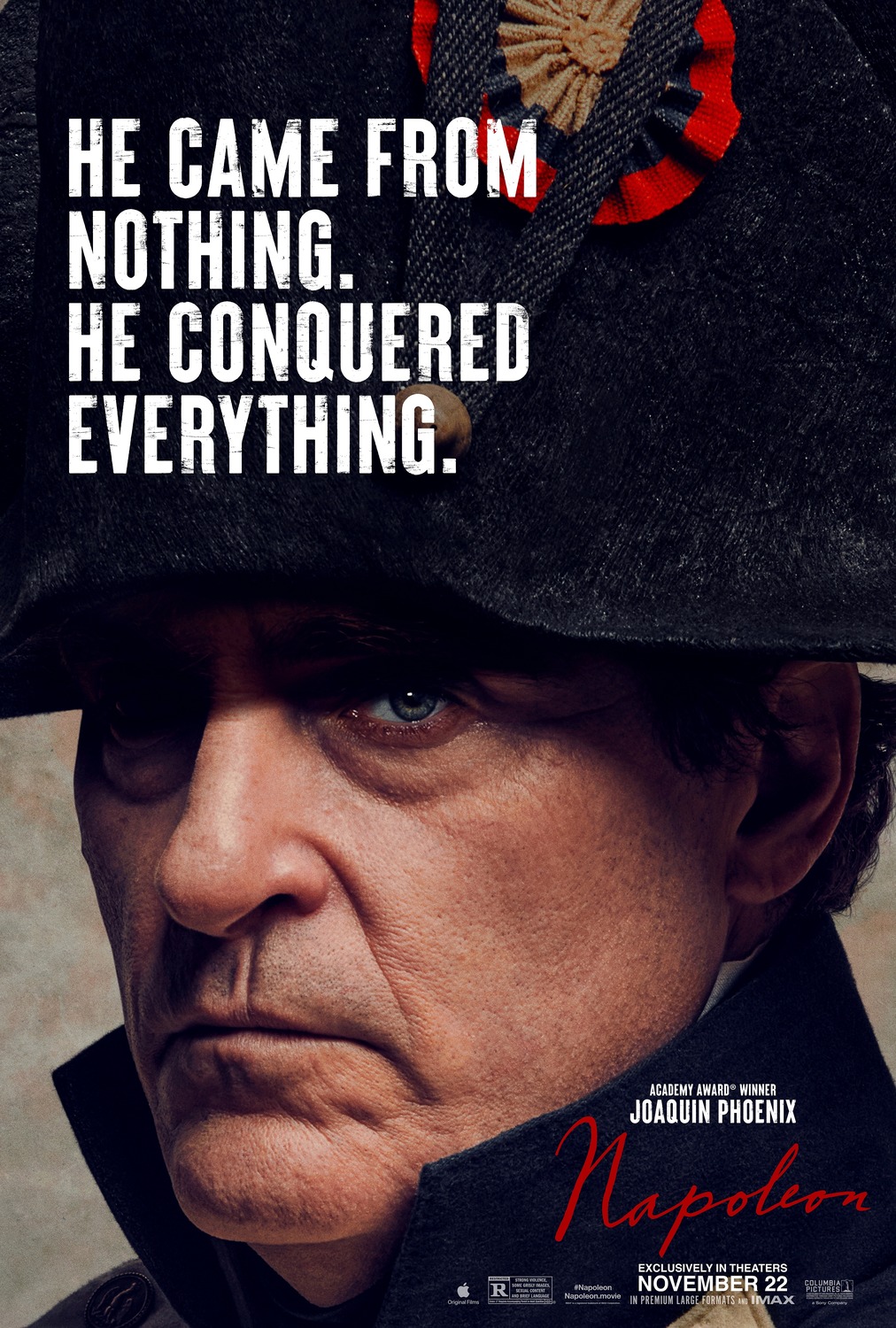Director
Ridley Scott
Starring
Joaquin Phoenix
Vanessa Kirby
Charting the course of the French Emperor’s rise – from his early twenties as a Captain in the French Revolution, to his inevitable defeat and exile 25 years later – Napoleon seeks to explore Napoleon Bonaparte [Phoenix] as a ruler, a military strategist, and an obsessive lover haunted by the unknowable Josephine [Kirby].
Cinematically speaking, the story of Napoleon Bonaparte has long eluded good adaptations. Sure, there are those who will defend specific performances and releases but nothing has truly captured the scope and impact of the man himself. And, regrettably, this latest effort is no different. But the film isn’t without merit or praise. Much like 1970’s Waterloo or 1927’s Napoleon, there are plenty of eye-watering and glorious examples of peak production design, not to mention a celebration of in-camera filmmaking that brings the late 1700s and early 1800s to life. Unfortunately, beneath the beautifully gilded surface, the bulk of the movie is remarkably hollow.
Let’s start with the man himself. Joaquin Phoenix was always going to be an odd choice. An artist absolutely capable of carrying this kind of adaptation, but one who would have been more suitable for the role a decade ago. Granted, at Waterloo Napoleon was in his mid forties (Phoenix himself being 49) but showing us the same individual and trying to pass him off as an ambitious young man in his early twenties is laughable. Regardless, this could be forgiven, if we were to see an evolution of character; the transition from a young reckless warrior out to prove himself, to a steadfast tactician. What we end up with is a story bereft of any sort of glimmer of who this person was or what drove him to be the man he became. Neither excessively heroic or intriguing, he’s monotone and oddly pathetic throughout. A figure screaming at the British Ambassador, “You think you’re so great because you have boats!” before mundanely and somewhat dispassionately surveying a battlefield. All of which falls oddly flat. The only sparks of emotion we really get are when Napoleon is interacting with Josephine. So maybe this film is more focused on the central pillar that is their love affair? Well, not quite.
The problem there is that the script really doesn’t know what to make of or do with Josephine. She is somehow both under-explored and yet at the centre of this story – but more as a manipulative trophy than a living person. Is she calculating? Is she neglected? Does she genuinely care for Napoleon? We never truly know. Regardless, Kirby does exceptional work, absolutely throwing herself into the role and trying to mine something of worth from what she’s given. But all the complexity and nuance of who this figure Napoleon fawned over so obsessively was is lost.
And there’s little additional comfort outside of the two leads. Whisking us through multiple decades and major events, we’re shown a waterwheel of supports that are paraded before us, then ushered away just as quickly. Case in point, when Josephine is first introduced, there are two children with her. And you’d be forgiven for thinking they were neither seen from or heard of again. Until right at the end of the movie, when Josephine dies (spoilers, I guess) and we learn that the young woman who has been in the background periodically was in fact her daughter. No idea what happened to the son though.
This is likely a byproduct of the film’s excessive ambition: racing through major events. By the time we’re half an hour in we’re through the revolution, the terror, Robespierre’s deposition, the royalist uprising and the conquest of Egypt. Which is likely what gave rise to such odd imagery as Napoleon firing a canon directly into the pyramids. Because how else would you succinctly show Egypt has fallen in less than 3 minutes? And to this end, we have to briefly discuss historical inaccuracies. Because this movie is a historian’s worst nightmare. I’ve always maintained that films are, first and foremost, a storytelling device, a method by which to elicit emotion and entertain. Documentaries are better suited for facts, but even they are susceptible to a narrative or agenda. That said, there is still a duty of care for all biopics largely due to the fact the public view them as factual. And with Napoleon playing so fast and loose with the truth, scenes that are genuinely astonishing are tainted with an air of doubt and suspicion. The burning of Moscow for example. You can’t help but question whether that was real or merely bloated sensationalist fiction.
The tragedy of this movie is that we never get a real insight into what this empire of Napoleon’s looked like or meant on the global stage, any more than we get to know what drove this enigmatic man. Did he simply want peace and stability, or was he a warmongering conqueror? Disappointingly, the film doesn’t have any answers. For all its ambition and jaw dropping production, Napoleon is all spectacle but no real substance.
Release Date:
24 November 2023
The Scene To Look Out For:
One of the movie’s saving graces is the action. And the Austerlitz attack in particular stands out. Not only for the sweeping choreography, editing and scale that Scott is extremely proficient at. But it’s also where the score (which is largely absent and subdued) is at its most interesting.
Notable Characters:
As stated, so many supporting roles are relegated to a handful of scenes that it’s hard to draw attention to any in particular. That said, nobody serves up a poor performance. Rupert Everett feels appropriate as Wellington, Ian McNeice’s brief appearance as Louis XVIII is solid, and Ben Miles feels dependable as ever. The real missed opportunity for me, was the underuse of Abubakar Salim as General Dumas. Telling the story of the father of the man who wrote The Three Musketeers, who happened to be the first black man serving as general in the French army is too interesting to pass up. And yet, passed-up he was.
Highlighted Quote:
“I want you to say that I’m the most important thing in the world.”
In A Few Words:
“Bombastic visual flair isn’t enough to save this surprisingly unperceptive feature.”
Total Score: 2/5

![The Red Right Hand Movie Reviews [Matthew Stogdon]](https://reviews.theredrighthand.co.uk/wp-content/uploads/2021/12/cropped-header1.png)



